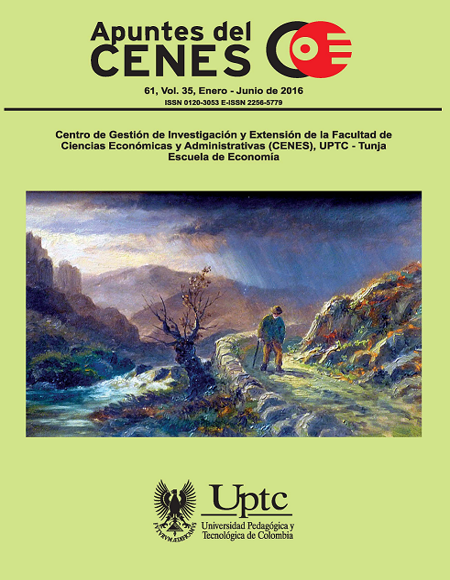Nature conservation on private land: Natural Reserves of Civil Society in Valle del Cauca

Abstract
Natural Reserves of the Civil Society in Colombia plays an important role in the conservation of ecosystems. This paper investigates why the owners of private areas in Valle del Cauca preserve nature in their properties. Explanations among economic rational choice theory, economic theory on reciprocal altruistic behavior and the theory of social psychology on the values of cultural orientation are considered. We found the predominant reasons for the establishment of nature reserves are self-interest and appreciation of the nature by land owners.
Keywords
conservation of nature, Natural Reserves of Civil Society, incentives, rational choice, altruism, cultural values orientation
References
- Becker, G. (1974). A theory of social interactions. Journal of political economy, 82, 6, 1063-1093. DOI: https://doi.org/10.1086/260265
- Bergstrom, T., Blume, L., & Varian, H. (1986). On the private provision of public goods. Journal of public economics, 29, 25-49. DOI: https://doi.org/10.1016/0047-2727(86)90024-1
- Cabrales, A., y Ponti, G. (2011). Preferencias sociales. En P. Brañas Garza (Ed.), Economía experimental y del comportamiento (pp. 109-124). Barcelona: Antoni Bosh.
- Chacón, C.M., y Solano, P. (2008). La conservación voluntaria por la sociedad civil en América Latina. En, C.M. Chacón (Ed.), Voluntad de Conservar: experiencias seleccionadas de conservación por la sociedad civil en Iberoamérica (pp. 5-11). San José: The Nature Conservancy y Fundación Biodiversidad.
- Escobar, P., y Solano, C. (2009). Colombia. En B. Monteferri y D. Coll (Eds.), Conservación privada y comunitaria en los países amazónicos (pp.109-136). Lima: Sociedad Peruana de Derecho Ambiental.
- Fehr, E., & Fischbacher U. (2002). Why social preferences matter –The impact of non-selfish motives on competition, cooperation and incentives. Institute for Empirical Research in Economics University of Zurich, Documento de trabajo No. 84. DOI: https://doi.org/10.2139/ssrn.299142
- Fehr, E. & Schmidt, K. (1999). A theory of fairness, competition, and cooperation. The quarterly journal of economics, 114, 817-868. DOI: https://doi.org/10.1162/003355399556151
- Hernández, R., Fernández, C., y Baptista, P. (2003). Metodología de la investigación. México, D.F: McGraw-Hill.
- Monteferri, B., Coll, D. (Eds). (2009). Conservación privada y comunitaria en los países amazónicos, Lima: Sociedad Peruana de Derecho Ambiental.
- Ocampo, N. (Ed.). (2010). Mecanismos de conservación privada: una opción viable en Colombia., Bogotá: Grupo Colombiano Interinstitucional de Herramientas de Conservación Privada G5.
- Ostrom, E. (2000). El gobierno de los bienes comunes: la evolución de las instituciones de acción colectiva. México: Fondo de Cultura Económica.
- Pena, J.A., y Sánchez, J.M. (2006). Altruismo, simpatía y comportamientos prosociales en el análisis económico. Principios, 4, 55-70.
- Sugden, R. (okkmmmmkkoooo1984). Reciprocity: The supply of public goods through voluntary contributions. The Economic Journal, 94, 772-787. DOI: https://doi.org/10.2307/2232294
- Schwartz, S. (2006). A theory of cultural value orientations: Explications and applications. Comparative Sociology, 5, 137-182. DOI: https://doi.org/10.1163/156913306778667357
- Schwartz, S. (2007). Value orientations: Measurement, antecedents, consequences across nations. En R. Jowel, C. Roberts, R. Fitzgerald y G. Eva (Eds.), Measuring Attitudes Cross-Nationally - Lessons from the European Social Survey (pp. 169-203). Londres: Sage. DOI: https://doi.org/10.4135/9781849209458.n9
- Unidad Administrativa Especial del Sistema de Parques Nacionales Naturales de Colombia (2001). Política de participación social en la conservación.
- Vásquez, M.L., Ferreira da Silva, M.R., Mogollón A.S., Fernández, M.J., Delgado, E., y Vargas, I. (2006). Introducción a las técnicas cualitativas en salud. Barcelona: Servei de Publicacions de la Universitat Autònoma de Barcelona.
- Zamagni, S. (1995). Economics of altruism. Boloña: Edward Elgar Publishing.
- Zamagni, S. (2006). Heterogeneidad motivacional y comportamiento económico. Madrid: Unión Editorial.